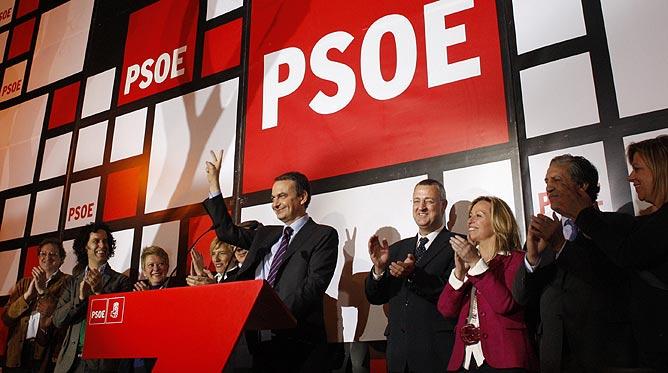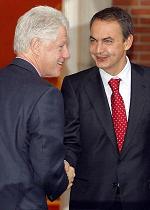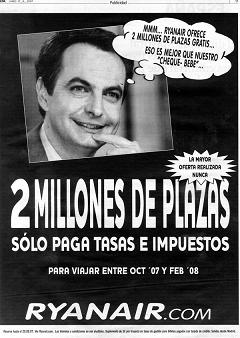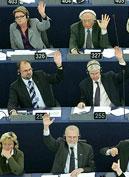This weekend José Luis Rodriguez Zapatero named his Cabinet and there were a few surprises. This is the first government in Spanish history to have more women ministers than men. Another first is that a woman has been appointed to head the Defence Ministery. Seven-months pregnant Carme Chacon was Minister of Housing during the last legislature and she told reporters it was an honour to have been made Minister of Defence in this one. She defines herself as a pacifist and her appointment is bound to have raised a few eyebrows among the Spanish military.
Zapatero said the new cabinet reflected the nature and objectives of his government and he also announced the creation of an Equality Ministry aimed at furthering women's rights in Spain and fighting domestic violence. This is a break down of the new Spanish Government
María Teresa Fernández de la Vega – First Vice-president and PresidencyFirst Vice-president and Minister of the Presidency. Spokesperson for the government during the last legislature. She has occupied various positions within the Justice Ministry; Secretary of State for Justice (1994); Magistrate (1989). She has also been a member of parliament in various legislatures.
Pedro Solbes – Second Vice-president and Economy and Treasury The Second Vice-president and Minister for the Economy during the last legislature. Delegate for Economic and Monetary Affairs for the European Commission (1999-2004). Minister for the Economy (1993-1996); Minister for Agriculture, Fisheries and Food (1991-1993). Member of parliament in various legislatures
Alfredo Pérez Rubalcaba – Home office MinisterDuring the last legislature he took over as Minster for the Home Office in April 2006. Before occupying this post he was both the Spokesperson for and President of the Socialist group in parliament. During Felipe González’s last government (1993-1996) he was Minister of the Presidency. Previously he occupied several other distinct positions within the government: Secretary of State for Universities, Secretary of State for Communication and Minister for Education and Science (1992). Professor of Organic Chemistry in the Complutense University of Madrid.
Elena Salgado – Public Administration Minister
During the last legislature she was the Minister for Health (until April 2006). Later on she went on to occupy the portfolio of Public Administration. She occupied various positions within the governments of Felipe Gonzalez: General Secretary for Communication for the Ministry of Public Works (1991-1996). From 1996 to 2004 she worked in several companies within the private sector.
Carme Chacón - Defence MinisterDuring the last legislature she took over from Trujillo as Minister for Housing in April 2006. In 1999 she was chosen as a councillor for the town hall of Esplugues de Llobregat and became the deputy mayor. She was a member of parliament in 2000 and 2004. She is a Professor of Constitutional Law in the University of Gerona.
Celestino Corbacho – Work and Immigration MinisterInvolved in local politics since 1983 in L’Hospitalet de Llobregat and mayor of this locality since 1994. Regional councillor for Barcelona and president for the regional government of this area since 2004.
Mariano Fernández Bermejo - Justice MinisterHe substituted López Aguilar in the Ministry of Justice in 2007. A lot of experience working in public prosecution. When PSOE took power in 2004 Bermejo was named the top Public Prosecutor in the High Court, the highest post within public prosecution. Previously he was in charge of public prosecution in Madrid from 1992 to 2003, a post which he left following his confrontations with the then Minister of Justice, Michavila. He was public prosecutor for the Supreme Court between 1989 and 1992. He also worked as an assessor in antiterrorist activities for the Ministry of Justice between 1986 and 1989. He has also worked as a public prosecutor in various courts.
Bernat Soria - Health MinisterNamed as Minister for Health in April 2006. Until then he was the Director of the Andalucian Centre on Regenerative and Molecular Biology. He has spent a long time researching stem cells. Professor of Physiology in the Miguel Hernández University in Elche. He became the first president of the European Network for Stem Cell Research, created in 2004.
Miguel Ángel Moratinos – Foreign Affairs MinisterMinister for Cooperation and Foreign Affairs during the last legislature. European Union special ambassador for the peace process in the Middle East from 1996 to 2003. During the last 6 months of 1996 he was the Spanish Ambassador for Israel. Previously he was the General Director of Foreign Policy towards Africa and the Middle East, General Director for Cooperation in the Arab world as well as occupying various other posts within the Ministry for Foreign Affairs.
Miguel Sebastián - Minister of Industry, Tourism and Commerce
Director of the Economics Office in Zapatero’s last government until October 2006 when he was designated as a candidate for mayor of Madrid. Following being defeated he gave up his post as councillor and returned to lecturing in the Complutense University in Madrid. He also worked as an advisor to Zapatero when PSOE was in opposition. Director of Study Services for the BBVA since 1999.
Mercedes Cabrera - Minister of Education, Social Affairs and the FamilyMember of Parliament in the 8th and 9th legislature. Minister for Education from 2006 to 2008. She only entered the world of politics two years ago when PSOE placed her number in second place on the electoral lists for Madrid for the March 2004 elections. She has worked as Co-Director of the magazine History and Politics. Member of the governing board of the Pablo Iglesias Foundation. Cabrera collaborated with PSOE in 1998 in the commission responsible for the Socialist’s electoral programme for the 2000 general election. Following PSOE’s victory in the 2005 elections Cabrera was named as the President of the Commission on Education and Science in the Spanish parliament for which she had the support of all parliamentary groups except for the PP.
César Antonio Molina - Minister of CultureMember of Parliament for Coruña for the 9th legislature. Minister for Culture between July 2007 and March 2008. Between May 2004 and July 2007 he was the director of the Cervantes Institute. Between 1996 and 2004 he was the director of the Círculo de Bellas Artes in Madrid and between 1985 and 1996 he was in charge of the Cuture sections for the Cambio 16 and Diario 16 newspapers. Before this he was a professor in the Complutense University in Madrid. He has also worked in the faculty of Journalism and Humanities in the Carlos III University in Madrid. He has published more than 30 books including plays, prose and poetry many of which have been translated into different languages. His lastest book, El rumor del tiempo was published in 2006.
Elena Espinosa - Minister of Agriculture and the EnvironmentMember of Parliament for Orense in the 9th legislature. Minister for Agriculture, Fisheries and Food between June 2004 and March 2008. From May 2002 until June 2004 assistant to the presidency of the Rodman group. Before joining the company she worked in the Galician Institute for Technical Medicine for two years. Between 1988 and 1996 she was the president of the Port authority in Vigo and between 1985 and 1988 she was responsible for the Urgent Reindustrialisation Zone of Vigo.
Cristina Garmendia – Research and Development Minister
President of the Spanish Association of Biocompanies (Asebio). In 2000 she founded Genetrix, a private company in the biotechnology sector. She is also president of the Inbiomed Foundation.
Magdalena Álvarez – Transport and Construction Minister
Member of parliament for Málaga in the 9th legislature. In the last government she was also the Minster for Transport and Construction (2004-2008). Member of parliament in the 8th legislature. Member of the Federal Committee of PSOE. Between 1994 and 2004 she was the advisor on the Economy and Treasury for the Regional Andalucian government. Previously she was a councillor for Malaga in the Andalucian parliament. She has been a professor of Economics in various educational institutions from 1977 to 1989. In 1979 she became a Financial Inspector for the State where she has occupied diverse posts in the Treasury Ministry and later on in the State Agency for Tax Administration. She was in charge of the Treasury in the local government of Malaga from 1987 to 1989, General Director of Regional Economic Incentives (1989 -1993) and Director of the Department of Tax and Financial Inspection for the State Agency on Tax Administration.
Bibiana Aido - Minister of EqualityThe youngest minister in the Spanish government, 31-year old Aido was chosen as member of parliament for Cádiz in the 2008 elections. Secretary for Equality in the Executive Provincial Commission for PSOE in Cádiz. Until now she has been the Director of the Andalucian Agency for the Development of Flamenco. Between 2003 and 2006 she was the regional delegate for the Andalucian Advisory Board on Culture. Previously she has worked for the University of Cádiz, Unicaza, Iturri S.A. and Caja San Fernando.
Beatriz Corredor – Housing MinisterUntil now she has been PSOE’s municipal spokesperson for Housing in the town hall of Madrid. She has been a property registrar since 1993 and before this she was the Director of the Property Register Studies Service for Castilla La Mancha between 2002 and 2006.
Labels: Spanish government, Spanish politics







